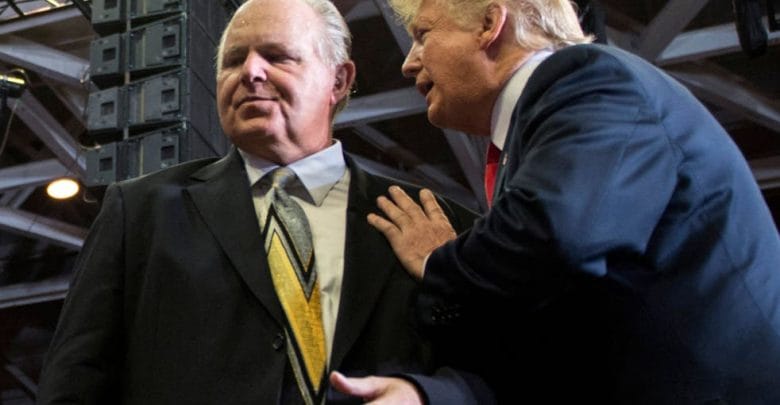
We wouldn’t have had President Trump without Rush Limbaugh
There is a lot of discussion in political circles now about the nature of “Trumpism” and whether it can survive former president Donald Trump’s downfall. Is the movement based merely on loyalty to the Master of Mar-a-Lago, or does it connote a dedication to a broader set of policies, such as barring immigration, raising tariffs and cutting taxes? If it’s the former, that suggests the movement is entirely tied to Trump’s fortunes. If the latter, then it can be carried on by whoever emerges as the dominant voice in the Republican Party post-Trump — assuming that Trump ever cedes the stage.
My view is that Trumpism does constitute a cult of personality, along with a commitment to a few policies. It’s impossible to imagine a pro-immigration Trumpist, for example. But more than any of that, Trumpism is all about the attitude. It’s not about rational argumentation about policies. And it’s definitely not about compromising to solve problems or reaching across the aisle. That’s for “cucks” and “snowflakes.”
No, Trumpism is all about “owning the libs.” It’s about claiming that Democrats are socialists who are going to destroy the country — to turn it into Venezuela! It’s about making fact-free accusations against Democrats (Hunter Biden’s laptop! Dominion voting machines!) while excusing any Republican failures. It’s about attacking the media and the elites and blaming them for everything you dislike — even for power failures in a deep-red state such as Texas. It’s about thinly veiled, or not so veiled, racism, nativism and sexism. It’s about spreading lies and cuckoo conspiracy theories. It’s about employing insults and personal derision as political weapons. And it’s about doing all of that with enough heavy-handed humor and hyperbole that you can always tell those who are offended: “What’s the matter? Can’t you take a joke?”
This is a style of politics perfected by Trump but invented by Rush Limbaugh, the pioneering radio talk-show host who died on Wednesday. Limbaugh was one of the most important political figures of the past 30 years — arguably the most important — because of how he transformed the conservative movement and the Republican Party for the worse.
It wasn’t just that he normalized racism, homophobia, nativism and sexism, giving all of those prejudices a national platform — although he did. As Media Matters for America notes, he called a law student who advocated for health-care coverage of contraceptives a “slut.” He mocked the victims of AIDS, argued that immigrants are trying to “invade” the United States and remarked that “all composite pictures of wanted criminals resemble Jesse Jackson.”
And it wasn’t just that he spread demented conspiracy theories — although he did. He suggested that White House lawyer Vince Foster was murdered and that the Clintons had something to do with it. He suggested that President Barack Obama wasn’t really born in the United States and was suspiciously partial to Islam. He suggested that Joe Biden hadn’t really won the 2020 election and that Trump had been a victim of voter fraud.
What really distinguished Limbaugh, and what made him such a success in radioland, was his gleeful hurling of insults and his mockery of liberals. “In the Limbaugh lexicon,” the New York Times noted, “advocates for the homeless were ‘compassion fascists,’ women who defended abortion rights were ‘feminazis,’ environmentalists were ‘tree-hugging wackos.’ ”
Jonathan Chait of New York magazine shrewdly noted what was missing from Limbaugh’s schtick: “His show was curiously devoid of any skill at argument. … He could blather for hours without going from a premise to a conclusion. His only tools for processing opposing points of view were assertion, mockery, and resentment.”
Reading that description of Limbaugh’s shortcoming made me realize that Trump has precisely the same weakness — or strength. Like Limbaugh, Trump cannot make policy arguments (he couldn’t care less) or marshal facts (he doesn’t know many). But, also like Limbaugh, he is perfectly capable of ranting for hours about his resentments and entertaining listeners with insults against their shared objects of antipathy.
Back in the 1990s, John Fund — a colleague of mine at the Wall Street Journal editorial page who worked as Limbaugh’s ghostwriter on his first book, “The Way Things Ought to Be” — suggested to the talk-radio host that he seek the presidency. Limbaugh declined; perhaps he couldn’t handle the pay cut or didn’t think he could win. But if you’ve ever wondered what would have happened if Limbaugh had run and won, you can wonder no more: Trump is pretty much the second coming of Limbaugh.
The question now is whether any other Republican can do as good an imitation of “El Rushbo.” Trump and Limbaugh share a certain crude charisma that Ted Cruz or Marco Rubio simply don’t display. Their attempts to imitate the Limbaugh-cum-Trump speaking style sound inauthentic and therefore aren’t compelling. But that won’t stop them and others from trying. Limbaugh and now Trump have largely banished serious policy argumentation from the Republican mainstream. They have made vacuous and venomous trash talk the dominant mode of communication on the right.
